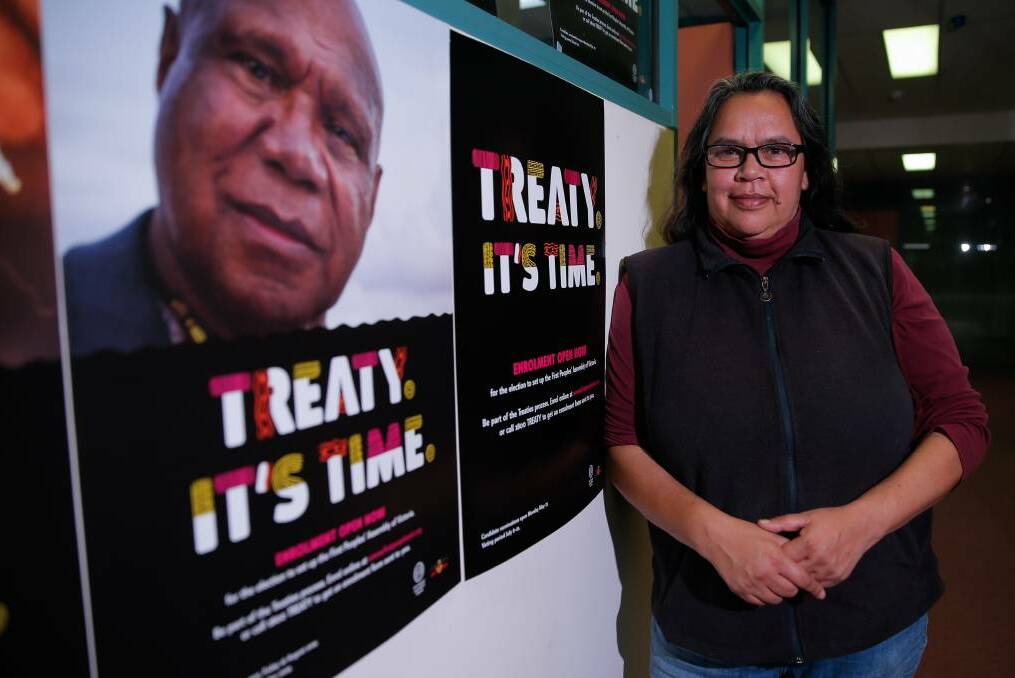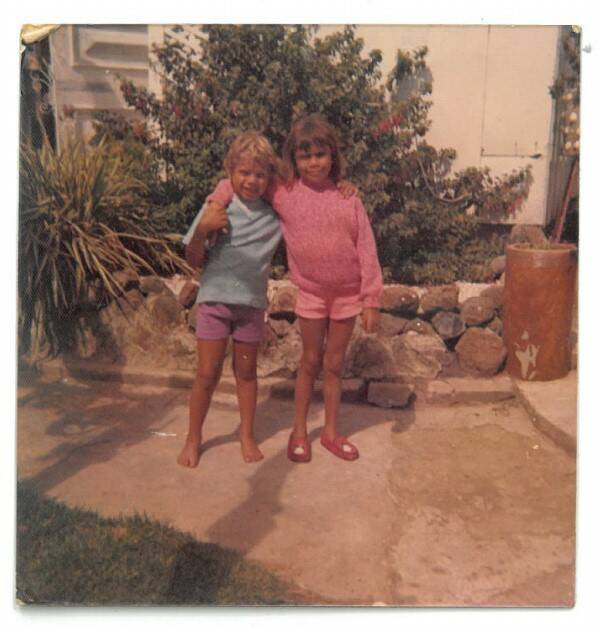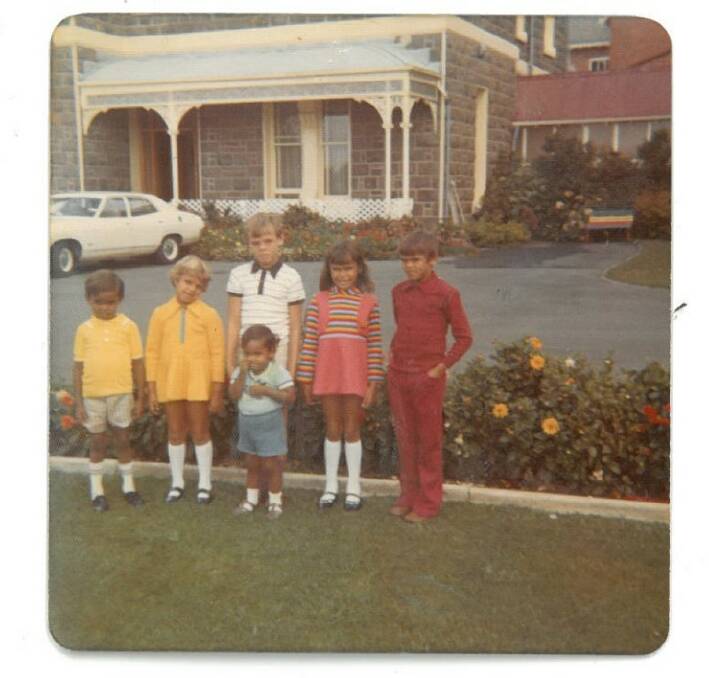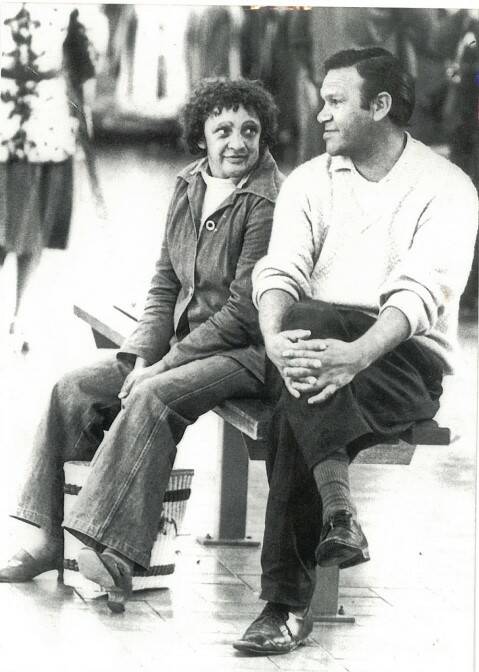
RECOGNISING Aboriginal sovereignty, which has never been ceded in this country, is the focus of Gunditjmara Elder Charmaine Clarke as she steps onto the First People's Assembly.
Subscribe now for unlimited access.
$0/
(min cost $0)
or signup to continue reading
She takes the place of former member Sissy Austin to represent the south-west region in Victorian Parliament.
Ms Clarke is a Gunditjmara woman and equality advocate in Warrnambool, and can often be seen conducting Welcome to Country ceremonies at key events around the region.
"It's two-pronged; it's about the recognition of sovereignty at a state wide level and negotiating a Treaty process," Ms Clarke said.
"It's a process at the moment, it's not set in stone, there are a whole range of interests and people who should be listened to.
"Particularly for the south-west, we want to see a fair and equitable harnessing of resources while protecting the environment and cultural integrity by working with local government and the local community."
The First People's Assembly of Victoria is the voice for Aboriginal communities across the state, representing them in the next phase of the Treaty process.
READ MORE:
"It puts everyone at the table, there's more equality and to me it levels the playing field so to speak in recognising that we have a right to be there," Ms Clarke said.
"We are the first state to do this and the state is being looked at across the country in their consideration for Treaty models.
"It's not one-size-fits-all though, we need to be aware of diverse geology, history and experiences; whether it's invasion history all the way to contemporary circumstances.
"The whole point is to better the position of negotiation that reflects priorities and recognises sovereignty.
"That to me is the linchpin of it - recognising sovereignty."
Treaty is not a new concept in Australia. There have been repeated calls for Treaty from Aboriginal and Torres Straight Islander people since British settlement.
One of the first decisions of the Assembly was to decide the type of Treaty model that would bring about the best benefits for Victorian Aboriginal communities.
In July 2020 the Assembly decided for both statewide and local Treaties.
Some focuses of a local Treaty for the south-west for Ms Clarke would be the environment, young people and tourism.

"These are ongoing and negotiable processes," Ms Clarke said.
"I'm a 'greenie' environmentalist myself and I think people are realising the need to pay greater attention to the environment and that we need to start doing things now.
"Fostering greener ways of doing things in the country, providing both economic growth and diversifying industry away from older and more pollutant practices and revitalising the regions.
"We tend to lose a lot of youth, including Indigenous youth, to the cities.
"Another element is that Australia is a well known country and we have our own little place in world in the south-west.
"It's one of the big areas been affected by COVID and our culture is the oldest living sustained culture in the world and gets a lot of curiosity from a lot of tourists.
"I would like to see Treaty work with Tourism Victoria and local governments around building collaborative projects around tourism.
"For example the Grampians is actually Gariwerd, we speak Aboriginal words without realising they are.
"We can revitalise and rethink this and Treaty can be a vehicle to assist this.
"There can be wins in it for everyone.
"It's not about taking anything away but about acknowledging the past, to be all on the same level playing field."
Ms Clarke wants to see watertight and concrete outcomes from the hard work of the First People's Assembly.
"We've got to get this absolutely right, it's got to be absolutely clear," she said.
"It's not in law and in the political arena things can be watered down and narrowed.
"We need to protect this process and ensure it's not sidelined by political interests.
"This is everybody's process, Victorians across the board. We don't want to put in all that hard work for someone to come along and just water it down or throw out the entire process.
"It's about time, it's 2021, it's time to get things started and for this to be embraced by everybody.
"It's not scary, people denied our existence, they denied we were human and denied our basic human rights.
"We are a civilised 21st century nation and it's time for us to start acting like one.
"It's is a real opportunity to shift the poverty line for Indigenous populations and re-instill a sense of pride, of place and of an existence that has been so fragmented within the community from racism, poverty, unemployment and health - a range of things that have a ripple effect."
The current work of the First People's Assembly is laying the foundation for future Treaties.

"I do know there is a lot of confusion about what Treaty is, but it's a grey area," Ms Clarke said.
"We are working in this grey area because this is unique.
"Other countries are way ahead of us, but different countries have different experiences.
"This is ours, this is the Victorian experience. It's exciting to be part of shaping and building a structure.
"I'm 54 and this will go on well beyond my life.
"To be part of having an opportunity to represent and support this process from its beginnings makes me quite proud.
"I've been recording Indigenous sites ever since I was 17, going out on Country to sites where my people lived. I've seen this country through those eyes, I see the south-west where we lived for thousands of years and places or things we've left behind.
"Whether it's paintings, trees, stone arrangements, stone houses - it's all through this landscape and it speaks to the ongoing connection and history that still lives today in us.
"I never thought at 17 when I was doing archaeology that at 54 I would get the opportunity to be part of the First People's Assembly, part of the next stage in this countries history and building a framework in the treaty process."
The south-west has a long and difficult history of colonisation.
She has faith the newly-launched Yoo-rrook Justice Commission will help mend the wounds of the past.
"My mother taught me a lot, she pointed out massacre sites and showed me mission letters written by mothers trying to get access to their children after they were taken off them, it's heartbreaking.

"Indigenous men in the south-west went off and fought for this country and came back to the places they called home given to soldier settlements and being told to move off, and that's in people's living memory.
"There's a whole range of conversations we need to be willing to have.
"We can't heal in isolation, this is an opportunity to learn, acknowledge and consider the effects of that treatment to the community and learn from those mistakes.
"It gives us a space to safely talk about these things and heal together."
"I've seen wonderful examples of little towns taking it up and it really shifts the social dynamic and whole feeling of a community.
"I want to see that happen in Warrnambool, it needs to. The wounds are still festering and they are polluting our communities.
"We have some way to go.
"It's not about individual blame, revictimising people or pointing the finger, but acknowledging this narrative and everyone's histories.
"We've all been living together and not talking about it, yet that very thing frames the way we relate to each other.
"Some people find it uncomfortable but but let's stop being uncomfortable with the truth, let's talk about it, heal with it and step into the future a better and more cohesive society.
"One priority is to start having community conversations for everyone to be part of in the local community."
Ms Clarke's role on the Assembly is to represent the region.
"The community builds it, they're the narrators, as a representative I'm speaking on behalf of others, I'm just being the voice."
READ MORE:
Have you signed up to The Standard's daily newsletter and breaking news emails? You can register below and make sure you are up to date with everything that's happening in the south-west.


